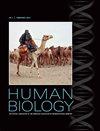阿塔卡马骷髅如何推进研究责任的负责任行为的讨论。
4区 生物学
Q2 Medicine
引用次数: 0
摘要
对有争议的管理的骨骼遗骸进行基因检测引起的争议提出了关于遗传研究人员固有义务的重要问题,以确保道德监管链。在本文中,我们分析和评估了关于是否应该发表这类研究的几种建议立场。根据合法监管体系的法理标准,我们认为负责任的研究行为需要合理关注监管链,但不能要求保证,特别是在古代遗骸的情况下。本文章由计算机程序翻译,如有差异,请以英文原文为准。
How the Atacama Skeleton Might Advance Discussion of Responsible Conduct of Research Responsibilities.
Controversies resulting from genetic testing on skeletal remains of disputed stewardship raise important questions about obligations inherent on genetic researchers to assure ethical chain of custody. In this article, we analyze and evaluate several proposed positions on whether such research should be published. Following jurisprudential standards for legitimate regulatory systems, we argue that responsible conduct of research requires reasonable attention to chain of custody but cannot require guarantees, particularly in cases of ancient remains.
求助全文
通过发布文献求助,成功后即可免费获取论文全文。
去求助
来源期刊

Human Biology
生物-生物学
CiteScore
1.90
自引率
0.00%
发文量
88
审稿时长
>12 weeks
期刊介绍:
Human Biology publishes original scientific articles, brief communications, letters to the editor, and review articles on the general topic of biological anthropology. Our main focus is understanding human biological variation and human evolution through a broad range of approaches.
We encourage investigators to submit any study on human biological diversity presented from an evolutionary or adaptive perspective. Priority will be given to interdisciplinary studies that seek to better explain the interaction between cultural processes and biological processes in our evolution. Methodological papers are also encouraged. Any computational approach intended to summarize cultural variation is encouraged. Studies that are essentially descriptive or concern only a limited geographic area are acceptable only when they have a wider relevance to understanding human biological variation.
Manuscripts may cover any of the following disciplines, once the anthropological focus is apparent: human population genetics, evolutionary and genetic demography, quantitative genetics, evolutionary biology, ancient DNA studies, biological diversity interpreted in terms of adaptation (biometry, physical anthropology), and interdisciplinary research linking biological and cultural diversity (inferred from linguistic variability, ethnological diversity, archaeological evidence, etc.).
 求助内容:
求助内容: 应助结果提醒方式:
应助结果提醒方式:


